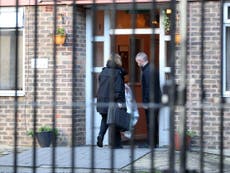It is clear that many Brexiteers would like to go back to an imagined past of imperial superiority. What they cannot admit was that the “left behind” were much further behind then than they are in our – far from perfect – welfare state.
In the empire days, the vast majority didn’t reap its riches or enjoy lives of ease and were certainly not “in charge”. My life today is vastly better than any of my predecessors who lived in the real austerity of the decades before we joined the EU.
But Brexit will slay the unicorn of Britain as a major player on the global stage: It is just an archipelago in the wastes of the North Atlantic between an EU rock and an American hard place. That is for the best – it’s time we joined the real world.
One thing of which we can be sure is that when our post-Brexit economic miracle goes belly up, Faragists won’t admit to being irrational, impractical charlatans. It will still be the fault of the EU. Plus ca change, plus c’est la meme chose.
John Cameron
St Andrews
Preventing terrorist attacks
The stabbings in London are vile and deplorable. But as Sean O’Grady suggested, longer prison sentences are not the answer.
Governments must work with communities to surmount contextual factors that often stir public fear, discontent and consternation namely: poverty, unemployment, gruelling injustices, racism, discrimination, social embarrassment and alienation, lack of rehabilitation programmes in prisons and poor reintegration into society. Time to initiate multifaceted approaches that address surrounding political, cultural, economic and religious factors of radicalisation.
Munjed Farid Al Qutob
London NW2
A great voyage for Britain
Championing his global free-trade policy in the wake of Brexit, Boris Johnson insists that the UK has now “embarked” on a “great voyage”.
Someone should remind the deluded “great helmsman” that the Titanic also embarked on a “great voyage”.
Sasha Simic
London N16
What trade?
In a spirit of post-Brexit open-mindedness, I started reading Iain Duncan Smith’s article on trade (“The future is bright – but we must be prepared to walk away without an EU trade deal”, Saturday 1 February).
In my opinion, it’s something of a misdescription. Out of 12 paragraphs, only two dealt with trade-related issues, one trotting out the “We must be ready to walk away…” mantra, the other advocating parallel negotiations with the US. Not a word about which sectors which will supposedly flourish as a result of Brexit, nothing on the costs British industry will face with the new paperwork which a no-deal Brexit will involve, nothing at all on our country’s services sector.
In fact, no substance at all on how British trade will be affected – for good or for bad – just a list of soundbites.
Paul Rex
South Warnborough
Counselling for pupils
It is good to see from Eleanor Busby’s article (Monday 3 February) that more schools now recognise the need for counsellors for their pupils and are putting aside precious funds for it.
I believe one aspect of that need is that one child in 29 experiences the death of a parent. That’s an average of one in every class. I had no idea of that until it affected our own family some years ago, sadly, it is shockingly commonplace.
Helen Watson
Wallingford





Join our commenting forum
Join thought-provoking conversations, follow other Independent readers and see their replies